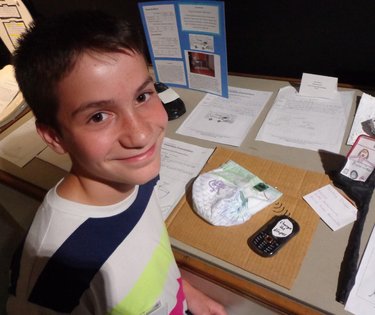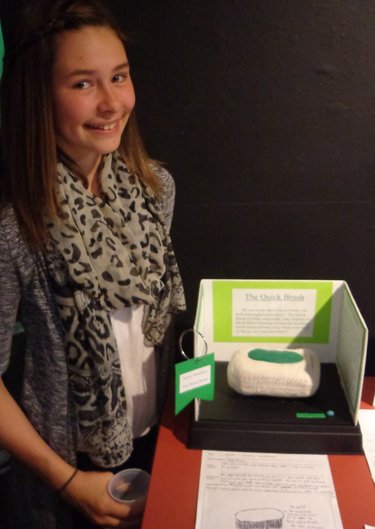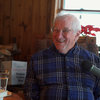BKW students invent with passion and compassion
— Photo from Edward Greene
Taylor Meacham stands with her enlarged model of a pill-sized invention that would transform a daily chore for dental hygiene. The Quick Brush is meant to clean teeth automatically, powered by saliva’s enzymes, and dissolve in the user’s mouth. She and four other sixth-graders in Edward Greene’s Berne-Knox-Westerlo class qualified as semi-finalists at the miSci Invention Convention this month.
SCHENECTADY — By their names, the Texting Diaper 3000 and The Quick Brush could be thought of as science fiction. But students at Berne-Knox-Westerlo and across the Capital Region were designing new inventions for applications of technology to solve real problems.
Each year, BKW sixth-graders qualify for the Invention Convention at the Museum of Innovation and Science in Schenectady, known as miSci, representing one of the few rural districts in the semifinals. Five BKW students qualified this year — Luke Valachovic with Texting Diaper 3000, Taylor Meacham with The Quick Brush, Kyla Creamer with Night Glow, Logan Boulette with Instant Snowman, and Callie Hempstead with Pull Down Cabinet — and Creamer was selected as one of the 25 finalists.
“Since I couldn’t find my glasses one night in the middle of the night, and they fell off the table. I couldn’t find them, and I almost stepped on them,” said Creamer. “So my mom and I were thinking, and I suggested glow-in-the-dark glasses.”
Creamer designed and modeled her idea, wrapping clay around a metal frame created by her father and coating the glasses with paint that glows in darkness. It is designed to avoid irritating the eyes.
After high school, Creamer wants to go to college to become a teacher, possibly in art.
“I like science because you can do hands-on activities and I like math because it’s really fun,” Creamer said of school.
“We get to do computer projects with math and create posters sometimes,” she said.
Taylor Meacham said she has trouble getting in the routine of brushing her teeth every night. The Quick Brush is the size of a pill, she explained, and has bristles on its surface. Powered by the enzymes in human saliva, Meacham’s invention would automatically brush a person’s teeth, releasing a mint flavor, and dissolve in the mouth once its job is finished.
“I was thinking that, sometimes, there’s not always time to brush your teeth, in the morning or at night, and that it would be useful if there was a way that you could do two things at once, and you could brush your teeth without even doing anything,” said Meacham, who wants to be a veterinarian.
The Texting Diaper 3000 sounds funny, its inventor, Luke Valachovic, admits. A chip in this modern diaper would send a message to a cell-phone number, announcing when the diaper is soiled.
“My aunt has two kids, and they’re both still little babies. So it would be easier, because, if you travel, it can tell you when the baby needs to be changed,” Valachovic said. For the model, he used a real diaper, dressed with wires connected to a video-game chip.
The diaper would have layers of material, which could be peeled away from the inside, conserving resources. Valachovic said it would have to be made of a strong fabric that is light and soft.
He likes science, he said, “because you get to explore more things.”
Edward Greene teaches sixth-grade science at BKW and oversees the projects submitted to Invention Convention. He said he doesn’t filter the projects; he submits any that interested students want.
Greene said the students’ projects require them to think about technology and how it can be used compassionately. He is proud of the students for how committed they were to their projects, he said, noting the quality that guest speaker Marco Aimi, a materials scientist at General Electric, said was integral for inventors during the May 20 awards ceremony.
“That follow-up is the most important piece,” said Greene of Aimi’s comments. “Not only with one idea, but with multiple ideas, to help solve the problem.”


